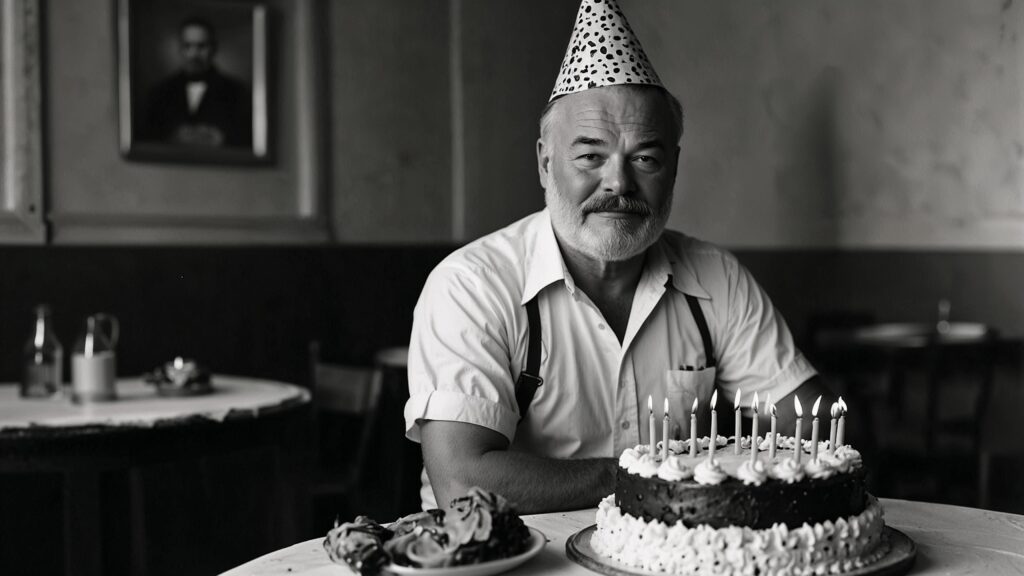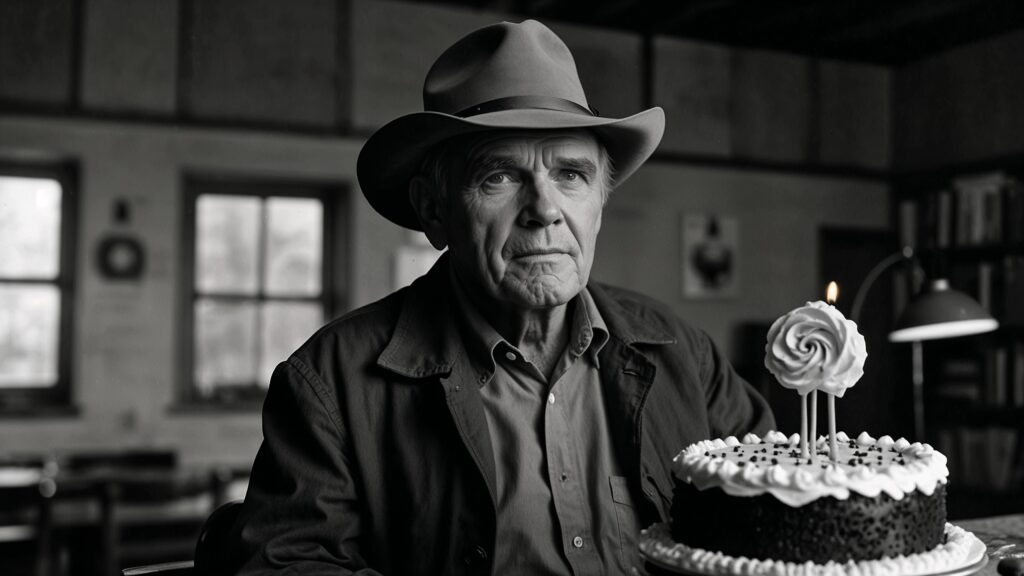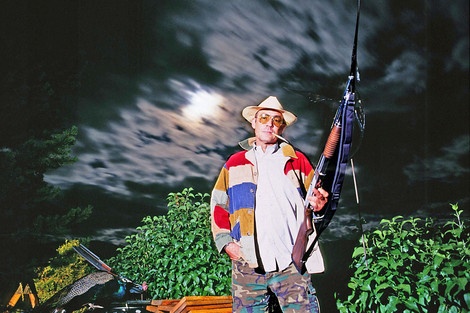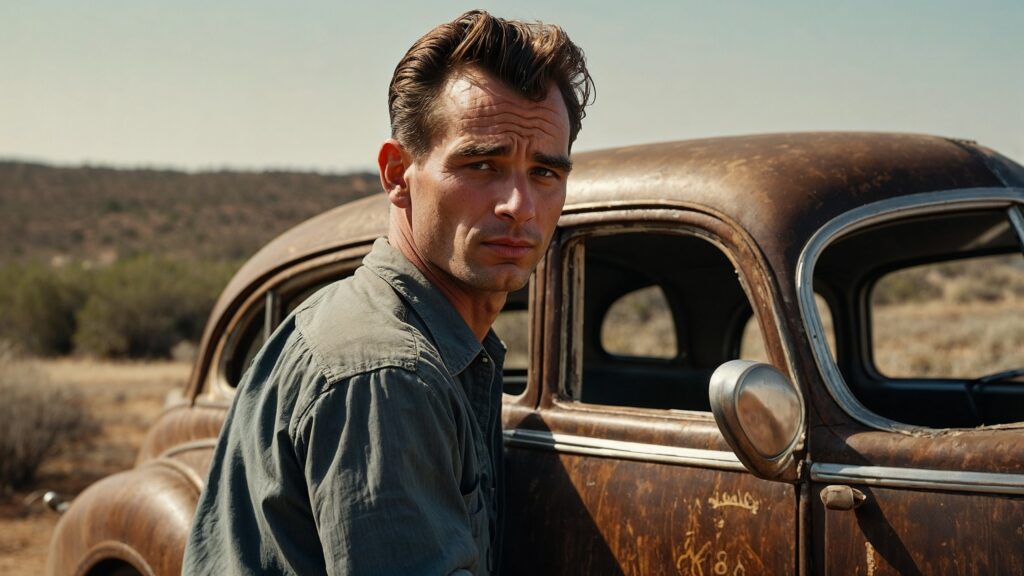
Seems like the last week or so has been a busy week or big-name literary births and deaths and such, does it not, dear reader? Maybe it’s just me. But the proverbial hits, as they say, just keep on coming. Today, July 21, we hoist our glasses, sloshing with the good stuff (with the good stuff today being defined as a big fuck-off bottle of Dark Hedges Irish Whiskey…I’m about to find out how good it is), to the indomitable, beard-shadowed colossus of America letters, Ernest Hemingway, born this day in 1899. The man carved his stories from the raw meat of existence, bloodied his knuckles on the world, and left us prose so lean it could cut glass.
I felt that paragraph deserve a snort of Whiskey…first impressions: burns a bit…a little raspy going down. But it will clearly get the job done. So now please join me, dear reader: pour one out, preferably something that burns going down, and let’s get to it.
Hemingway was a one-man war zone, a walking manifesto of grit and gusto. Born in Oak Park, Illinois, he didn’t waste time sipping tea with the bourgeoisie. By 17, he was banging out copy for the Kansas City Star, learning to strip sentences to their bones – short, sharp, true. That style, that relentless economy of words, became his machete, hacking through the jungle of horseshit that passes for literature. To wit:
- The Sun Also Rises – More of a bullfight than a book, all blood and dust and broken hearts in Pamplona. This 1926 novel follows Jake Barnes, a war-wounded expat journalist nursing a literal and figurative impotence, as he drifts through the booze-soaked cafés of Paris and the sun-scorched fiestas of Spain. He’s tangled up with Lady Brett Ashley, a magnetic, reckless beauty who loves him but can’t stay faithful, and a crew of disillusioned drifters – lost souls of the Lost Generation. They drink, they bitch at each other, they chase bullfights and heartbreak, all while grappling with the emptiness of a world that’s been shot to hell. It’s a story about longing you can’t satisfy, purpose you can’t find, and the cruel grace of just keeping on. Hemingway’s sparse prose makes every glance, every drink, every bull’s charge feel like a wound you didn’t see coming. [A second slug of the Dark Hedges…burns less than the first one, which is usually how these things go. Less of a shock to the system.]
- A Farewell to Arms – A love story that kicks you in the teeth and leaves you gasping. Set against the chaotic Italian front of World War I, it’s the tale of Frederic Henry, an American ambulance driver who falls hard for Catherine Barkley, a British nurse with a past as haunted as the war-torn landscape. Their romance is desperate, all-in, a fleeting sanctuary amid the mud, blood, and betrayal of war. Of course, Hemingway doesn’t do bullshitty fairy tales – love gets battered by shellfire, bureaucracy, and fate’s cold indifference. When the couple flees to Switzerland, the story’s liver-kick of an ending reminds you that life doesn’t owe you a happy ending, just the strength to face the wreckage.
- For Whom the Bell Tolls – Robert Jordan, a Montana dynamiter, joins a gang of Spanish guerrillas fighting Franco’s fascists in the Civil War. His mission is to blow a bridge to stop the enemy’s advance. Over four days, he grapples with love (enter Maria, a survivor with fire in her eyes), loyalty, and the ticking clock of mortality. The title, cribbed from John Donne, says it all: no man’s an island, and every death chips away at us all.
But let us not, as you might in some other lit classes, get lost in the canon. Hemingway’s life was the real novel – louder, messier, and more alive than any page could hold. The man drove ambulances in World War I, got himself blown up and still crawled back for more. He hunted big game in Africa, fished marlin that could swallow your ego whole, and boxed like he was settling scores with God. He drank like a pirate, caroused in Parisian cafés, and turned Key West into his personal fiefdom of whiskey and words. He did time in Cuba, slinging daiquiris and stories with equal swagger. He jumped into Spain’s Civil War, dodging bullets and scribbling almost surreal dispatches. And yeah, the man had flaws – big, jagged ones. He could be a prick, a chauvinist, a violent storm of ego and insecurity. But what writer isn’t at some (or most) points? Four wives, countless feuds, and a temper that could torch a room. But so what? Who wants a saint? Saints don’t stare into the abyss and come back with The Old Man and the Sea. That book, that lone fisherman battling the ocean’s wrath, is Hemingway distilled – stubborn, solitary, and unyielding, even when the sharks come circling.
Gen Zers tend not to get it. They tend to stare with stunning jadedness and mumble something about how “the world has changed.” We’re drowning in tweets and memes, and Papa’s iceberg theory, where seven-eighths of the story lurks beneath the surface, feels like a relic. But fuck them. Hemingway’s still relevant, still dangerous. In a world fat and bloated with hot takes and clickbait, his clarity is a switchblade. And his life is a reminder to live hard, love fiercely, and write like your heart’s on fire, even if it leaves you scarred.
So here’s to you, Ernest…on your 126th birthday, we’re raising a glass of Dark Hedges, no ice, no apologies. Happy birthday, Papa. Keep swinging in the great barroom brawl of eternity.
Now, dear reader – go read A Moveable Feast, chase it with a shot of absinthe, and write something that’d make Hemingway nod from the great beyond. Or at least spill some booze in his honor. Cheers.
N.P.: “Bottle With Your Name On It” – Thomas Rhett





